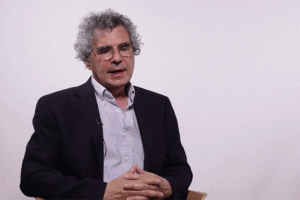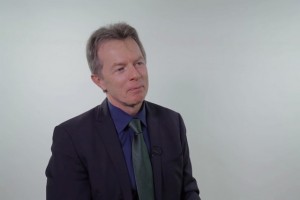Ethics for an Age of Commerce
Economist Deirdre McCloskey on fundamental human virtues, their secular interpretation and necessary applicati...
One of the oldest problems in philosophy is the problem how do we know that anything exists? How do we know that there’s a world even outside my mind? I look around and there’s a world of tables and chairs, and trees and buildings, how do I know that any of it is real? The philosopher Rene Descartes dramatized this with a thought experiment. How do you know that you’re not being fooled by an evil genius who’s manipulating your sensations and your perceptions to produce experiences as of a world around you, when none of it is real? The philosophers call it the problem of skepticism. The skeptic says: maybe you’re being fooled by an evil genius? It would be exactly the same for you if you were, so you can’t know that any of this is real.
The modern version of this fable of Descartes’ is raised by a hypothesis that we’re in a computer simulation. Maybe we’re in a simulated world much like the world depicted in the movie The Matrix, where there’s a computer that runs the world with models of trees, and cars, and buildings, but actually my brain’s just receiving all these signals from the simulated world and none of it is real. Or maybe I’m just part of the simulation myself: my brain is simulated, the world is simulated, none of it is real. So many philosophers can think, this example from the case of computer technology is a beautiful dramatization of Descartes’ challenge.
How could you know that you’re not in a computer simulation, if you are in a computer simulation – nothing is real, so how can you know anything at all?
This problem recently has been actually made much more acute by a contribution from a philosopher Nick Bostrom who’s given a statistical argument, that maybe we are in a computer simulation. The idea is something like this: simulation technology is getting better and better. Now we all run videogames with small simulated worlds: the Sims, SimCity, SimLife. Eventually we will be running SimUniverse – simulating the whole universes, as the technology gets better and better almost any intelligent civilization could be expected to run many simulations with many universes and many simulated beings. Once you start thinking about this, you think, well, for every person in one of these universes they might create hundreds of simulated universes and eventually the simulated universes will greatly outnumber the original universe and the simulated people will outnumber the original people. When you start thinking about this: well, for every unsimulated person there will be thousands and millions of simulated people. And you ask yourself a questions: how do I know that I am unsimulated? It starts to seem much more likely that I am simulated. There’re so many simulated beings: the odds are tiny that I would be unsimulated. So this is a kind of statistical argument that maybe you should consider it very likely that we’re in a simulation or either it’s very likely that we’re in a simulation where something goes wrong to stop simulations from developing. But it’s at least a reason to take very seriously the idea that we’re in a simulation.
At this point I think maybe there’s a philosophical mistake going on in the traditional analysis of this example. My view is that yes, it’s possible that we’re in a simulation. But if we’re in a simulation, all this is still perfectly real. Just say it turns out that we discover somehow that we’re in the ‘matrix’. And the tables, and chairs, and buildings around me are all coming from a computer simulation. Should we say, “They don’t exist”? I think not! I think we should say that we’ve discovered something about what tables, and chairs, and buildings are made of. We’ve discovered something about what the physical world is made of, about the metaphysics of the physical world, if you like. We’ve discovered that this is a world that’s made of information, it’s a world that’s made of bits. The tables and chairs around me are all made of bits in a computational process. This is actually an idea that some physicists have entertained. There might be some layer of information underlying everything. And importantly, it’s not a skeptical hypothesis, according to these physicists, one where nothing exists. It’s really more of a metaphysical hypothesis about the underlying nature of reality.
It does have some interesting consequences, if we live in a simulation. It turns out, for example, that maybe this simulation was created!
Who created the simulation? It was the programmer in the next universe up. Maybe this programmer could be considered to be a god of our world. The programmer may not have many of the properties of a traditional god, he or she may just be a teenager, hacking on a computer and running five universes in the background, probably not an especially ‘almighty’, or a being who is morally benevolent, who we should worship. But it might be someone who is nonetheless omniscient, all-knowing, and all-powerful about our world – some interesting consequences for theology. But for epistemology and metaphysics if we’re living in this simulation (it’s possible that we’re in a simulation), the objects are still real. So this reorients our way of thinking about the skeptical problem.
I am not a skeptic about the external world. I think that maybe we’re in a computer simulation, I can’t rule that out. But if we are in a computer simulation, there’re still tables, there’re still chairs, and so on. So basically I am happy to say that we know, there’re tables, and chairs, and so on. This analysis of the simulation hypothesis, I think, makes our knowledge about the external world much more robust than it would have been otherwise.
Whether we’re in a simulation, or a dream, or an evil genius, there’s still a world around me: there’re still tables and chairs.
It’s easier, if you like, for them to exist than one might have thought. This is actually a strategy of combatting the skeptic and saying, we do know about the external world.
For me this suggested, maybe, it’s possible to answer the skeptical challenge: how do you know about the external world. Fundamentally our grip on the external world is a grip on its structure: structure that might be present in a computer simulation, or in a physical world, or an evil demon, and so on. And what we fundamentally understand about the world is its structure – the kind of mathematical or logical structure of the world. And in that world that structure will be present in many different ways that our experiences could be generated. So my hope is that by thinking seriously about this idea – that we’re in a simulation – about what it says about the underlying reality it might ultimately give philosophers and scientists some resources to answer this biggest of all philosophical challenges: how can we know about the external world.

Economist Deirdre McCloskey on fundamental human virtues, their secular interpretation and necessary applicati...

Philosopher Daniel M. Hausman on social equality, luck egalitarianism, and people’s relations

Philosopher David Schmidtz on ethical dilemmas, moral institutions, and the nature of justice